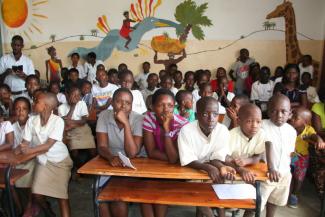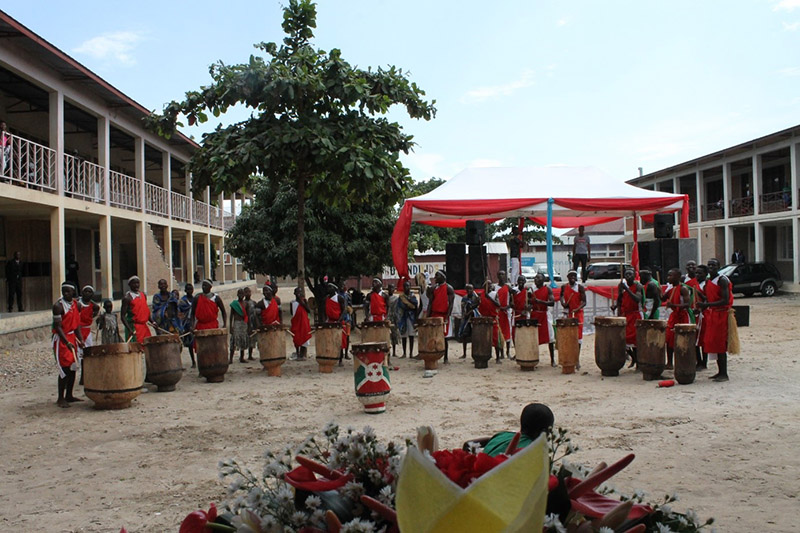Development work
Stolen childhood

Burundi’s children have the same desires as children anywhere else in the world. They want to play, go to school, have enough to eat, enjoy a comfortable family life and live in peace. For decades, they have been virtually denied these things. Families have been worn down by constant turmoil and civil war – with particularly devastating effects in 1972 and 1993. Many children have lost one or both of their parents.
Since the middle of 2015, the situation has deteriorated again and taken on a new dimension. In late April 2015, demonstrations were staged in and around the capital Bujumbura in protest at the highly controversial re-election of President Pierre Nkurunziza (see D+C/E+Z e-Paper 2016/02, p. 47). After a failed coup attempt, the government response became brutal. The police shot and killed many young people, and families fled the area. Youngsters who took part in the demonstrations were tracked down, arrested and physically abused. Since 2016, children and teenagers have regularly been picked up on the streets and taken to a remand centre. Many are small street traders, and their merchandise is confiscated. Children report that the police perpetrate the worst violence they experience.
The fact that lots of children live in the streets in Burundi is due to a number of reasons. Years of civil war have plunged the people into grinding poverty and made common the collapse of family structures. The country’s many widows re-marry because, to be fully recognised and respected in Burundi, a woman needs to be a wife. In many cases, children from the first marriage suffer as a result, because the new husband does not treat them well.
The kids concerned are almost always exploited for labour. In urban areas, they must do housework while their half-siblings go to school. They are denied schooling. In rural areas, they fare no better. They have to look after livestock, fetch water and firewood and, at night, may have to sleep outdoors. Unless other relatives intervene, many youngsters run away to the capital Bujumbura to fend for themselves on the street.
The plight of girls
Girls suffer particularly under these undependable family circumstances. Traditionally, the eldest daughter is responsible for looking after the younger children. This means she is usually not allowed to go to school. She has to tend her young siblings, help her mother in the fields and carry out other household duties. If she does get the chance to go to school, she is rarely allowed to stay beyond grade six. She will then have reached puberty, and is thus considered to be of marriageable age in many parts of the country.
The law forbids marriage at such a young age, but the parents ignore that. Poverty makes the situation worse – because marriage means providing a dowry. What is more, the girl becomes part of her husband’s family. She leaves the family home forever – at traditional weddings often in tears. Girls who are married too early are exposed to the risks of pregnancy and hard work.
If a girl is half-orphaned and gets a step-mother, she is often badly treated and exploited for labour. If she gets a step-father, there is a risk of rape and unwanted pregnancy. And a girl who gets pregnant finds herself in a desperate plight because her family rejects her.
Pregnant girls left to fend for themselves are helped by Fondation Stamm at a home exclusively for underage mothers. This non-profit foundation also runs a number of homes for orphans and street children in Bujumbura and rural areas, and it operates schools and a hospital (see background box).
Even in an intact family, life is not easy for children in general – and for girls in particular. In Burundi, the security that extended families used to provide has been eroded by poverty. Girls are often sent out to work from an early age, employed for a pittance as a nanny in a well-to-do family, for example. Looking after lots of small children is exhausting for a 12-year-old. And there is always the risk of her being raped by a member of the household.
Sometimes these girls are forced to marry another member of the household staff, and that typically soon results in a pregnancy she does not want. One of the girls helped by Fondation Stamm is Adèle, who lost her parents in the civil war. She went to live with her grandmother and got pregnant, whereupon she was ordered to leave and went to work as a nursemaid in Bujumbura. When it was noticed that she was pregnant, she was fired and had to leave the house. Fondation Stamm took her in and enabled her to attend school again. Today, Adèle has a decent educational background and works as a book-keeper. She is one of the lucky few.
Boys’ responsibilities
Life is not easy for boys either, even for those who do not experience a broken home. One of a boy’s traditional responsibilities is to support his parents in old age. So, boys are more likely to be sent to school. In exchange, the parents hope and expect that they will receive support and recompense later for the money they spend on schooling.
Today, that system of inter-generational give and take has been undermined by high unemployment. Many youngsters, whatever skills or qualifications they may have acquired, are unable to find work. Some start a small business to earn money, but the majority ends up on the street selling nuts, boiled eggs, second-hand clothing from Europe or SIM cards. Youth unemployment is a time-bomb that either spreads despondency or sparks rebellion.
Girls are not seen selling on the street. Many with qualifications look for work in bistros or food stores – rarely in positions that match their qualifications. Girls with no education sell themselves, making a living as prostitutes.
Children who are able to attend school do so with enthusiasm. In urban areas, there is now widespread evidence of girls achieving ever-better results in the classroom. In rural areas, there are major obstacles to children attending school and completing their education. Families live widely dispersed and the nearest school may be difficult to reach.
Verena Stamm is the founder of Fondation Stamm, which supports street children and orphans in Burundi. A German partner organisation is burundikids. In November 2017, Verena Stamm was awarded the Federal Cross of Merit for her work. Engagement Global has supported several of her projects.
https://www.fondation-stamm.org
http://burundikids.org/index.html













